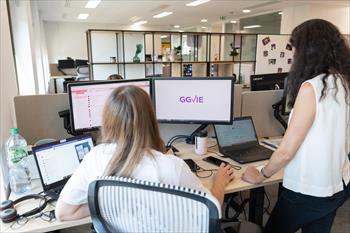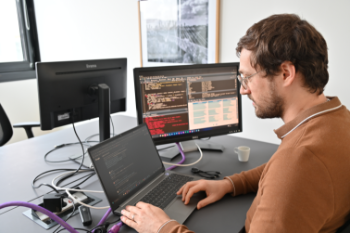
Starting Research Position Visit F - M Postdoctoral Position - Systems Biology And Metabolic Modelling Of Uncultured Bacteria H/F INRIA
Talence - 33 CDD- 24 mois
- Bac +5
- Service public des collectivités territoriales
Les missions du poste
Starting Research position Visit F/M Postdoctoral position - Systems biology and metabolic modelling of uncultured bacteria
Le descriptif de l'offre ci-dessous est en Anglais
Type de contrat : CDD
Contrat renouvelable : Oui
Niveau de diplôme exigé : Thèse ou équivalent
Fonction : Chercheur contractuel
A propos du centre ou de la direction fonctionnelle
The Inria center at the University of Bordeaux is one of the nine Inria centers in France and has about twenty research teams... The Inria centre is a major and recognized player in the field of digital sciences. IT is at the heart of a rich R&D and innovation ecosystem : highly innovative SMEs, large industrial groups, competitiveness clusters, research and higher education players, laboratories of excellence, technological research institute...
Contexte et atouts du poste
The postodoctoral position is offered as part of a partnership between (the French National Research Institute for Agriculture, Food, and the Environment) and (the French National Institute for Research in Digital Science and Technology). IT is funded by the TARGET project, promoted by "high-risk research" programme.
The TARGET project is an interdisciplinary initiative combining microbiology, culturomics, genetic engineering, systems biology, and modelling. IT is a four-year research project. The postdoctoral position offered within this project is for an initial two-year period, with the possibility of renewal for an additional two years.
Context of the project :
Since the late 19th century, microbiologists have been developing culture media and techniques to study microorganisms such as bacteria, archaea, yeasts, and filamentous fungi. However, only a small fraction of bacterial species are currently cultivable, severely limiting their study. While advances in metagenomics have highlighted this limitation, genome sequencing alone has not provided sufficient explanations for why many bacterial species remain unculturable. This lack of cultivability remains a scientific enigma and a major barrier to applications in fields such as disease control, antibiotic discovery, biomolecule production, microbiome management, and bioremediation. In bacteria that live in association with eukaryotic hosts, understanding metabolic interactions with their partners opens new possibilities for developing tailored culture media, thereby facilitating their study. Using grapevine Flavescence Dorée phytoplasma as a proof of concept, the TARGET project aims to demonstrate that integrating systems biology, genome engineering, and culturomics can help overcome the challenge of bacterial non-cultivability.
This postdoctoral position is part of the project's metabolic modelling work package, with objectives including the development of numerical models for the metabolism of minimal bacteria and Flavescence Dorée phytoplasma. These models will BE used to predict suitable culture media. The project involves close collaboration between modellers and microbiologists to bridge computational and experimental approaches.
The recruited researcher will work in collaboration between team in Talence and (Fruit biology and Pathology) unit at Villenave d'Ornon. At Inria, the work will BE carried under the supervision of. Pleiade hosts researchers in mathematics, computer science and computational biology working on developping approaches for microbioal community characterisation. Two teams are involved at INRAE : MOLLI (Pascal Sirand Pugnet) where most of the experimentations will BE carried out, and META specialisedin metabolic modelling. The co-supervisor of the position is, researcher in theMETA team.
Mission confiée
The recruited postdoctoral researcher will BE the main modeller of the systems biology work package.
The work focuses on constructing metabolic models of Mollicutes and Flavescence Dorée phytoplasma (FDp) to better understand their metabolic functions and predict suitable growth media. Initially, the work will apply proven strategies to well-studied Mollicutes, refining models and predicting culture conditions, followed by validation experiments carried out by collaborators. A similar approach will then BE used to develop and validate models forSpiroplasma citriand FDp. Comparative metabolic network analysis across Mollicutes will help generate functional insights, while further efforts will explore dynamic models of FDp metabolism within its hosts. Ultimately, the project aims to integrate symbiotic interactions into these models to enhance understanding of FDp physiology in insect vectors.
Strong collaborations are planned withing the TARGET consortium in order to provide hypotheses for new experimentations and to integrate into models experimental results.
See the following references for details on the team activities and approaches used in the project :
- Belcour, A., Got, J., Aite, M., Delage, L., Collén, J., Frioux, C., Leblanc, C., Dittami, S. M., Blanquart, S., Markov, G. V., and Siegel, A. (2023). Inferring and comparing metabolism across heterogeneous sets of annotated genomes using AuCoMe. Genome Research.
- Cerk, K., UgaldeSalas, P., Nedjad, C. G., Lecomte, M., Muller, C., Sherman, D. J., Hildebrand, F., Labarthe, S., and Frioux, C. (2024). Communityscale models of microbiomes : Articulating metabolic modelling and metagenome sequencing. Microbial Biotechnology, 17(1), e14396.
- Ghassemi-Nedjad, C., Bolteau, M., Bourneuf, L., Paulevé, L., and Frioux, C. (2024). Seed2LP : seed inference in metabolic networks for reverse ecology applications. BioRxiv.
Principales activités
- Reconstruction, curation, and comparison of metabolic networks from genomic data.
- Use and development of various metabolic models : individual-scale models, dynamic models, and community models.
- Writing scientific articles.
- Collaborating with microbiologists to refine models and guide experiments.
Compétences
Technical Skills and Required Level :
- Experience in modelling and systems biology
- Good programming skills, preferably in Python
- Good practices in software development
Languages :
- Proficiency in English is expected for disseminating results through research papers and in conferences
Interpersonal Skills :
- Ability to work collaboratively in an interdisciplinary environment
- Strong analytical and problem-solving skills
- Good communication and teamwork abilities
Additional Desirable Skills :
- Knowledge of metabolic modelling techniques
- Experience in bioinformatics and data analysis
- Familiarity with high-performance computing environments
- Experience in collaborating with experimental biologists
Avantages
- Subsidized meals
- Partial reimbursement of public transport costs
- Leave : 7 weeks of annual leave + 10 extra days off due to RTT (statutory reduction in working hours) + possibility of exceptional leave (sick children, moving home, etc.)
- Possibility of teleworking and flexible organization of working hours
- Professional equipment available (videoconferencing, loan of computer equipment, etc.)
- Social, cultural and sports events and activities
- Access to vocational training
- Social security coverage
Rémunération
The gross monthly salary will BE 2788€ (Before social security contributions and monthly witholding tax).
Bienvenue chez INRIA
A propos d'Inria
Inria est l'institut national de recherche dédié aux sciences et technologies du numérique. Il emploie 2600 personnes. Ses 215 équipes-projets agiles, en général communes avec des partenaires académiques, impliquent plus de 3900 scientifiques pour relever les défis du numérique, souvent à l'interface d'autres disciplines. L'institut fait appel à de nombreux talents dans plus d'une quarantaine de métiers différents. 900 personnels d'appui à la recherche et à l'innovation contribuent à faire émerger et grandir des projets scientifiques ou entrepreneuriaux qui impactent le monde. Inria travaille avec de nombreuses entreprises et a accompagné la création de plus de 200 start-up. L'institut s'eorce ainsi de répondre aux enjeux de la transformation numérique de la science, de la société et de l'économie.
Hellowork a estimé le salaire pour ce métier à Talence
Le recruteur n'a pas communiqué le salaire de cette offre mais Hellowork vous propose une estimation (fourchette variable selon l'expérience).
Estimation basée sur les données INSEE et les offres d’emploi similaires.
Estimation basse
33 600 € / an 2 800 € / mois 18,46 € / heureSalaire brut estimé
43 800 € / an 3 650 € / mois 24,07 € / heureEstimation haute
58 200 € / an 4 850 € / mois 31,98 € / heureCette information vous semble-t-elle utile ?
Merci pour votre retour !
- Talence - 33
- CDD
Créez une alerte
Pour être informé rapidement des nouvelles offres, merci de préciser les critères :
Finalisez votre candidature
sur le site du recruteur
Créez votre compte pour postuler
sur le site du recruteur !
sur le site du recruteur
sur le site du recruteur !
Ces offres pourraient aussi
vous intéresser





Recherches similaires
- Job Data scientist
- Job Informatique
- Job Bordeaux
- Job Libourne
- Job Langon
- Job Arcachon
- Job Montagne
- Job La Teste-de-Buch
- Job Mérignac
- Job Lacanau
- Job Coutras
- Job Biganos
- Job Développeur
- Job Technicien informatique
- Job Technicien support informatique
- Job DevOps
- Job Chef de projet informatique
- Entreprises Informatique
- Entreprises Data scientist
- Entreprises Talence
- Job Fonction publique
- Job Collectivités
- Job Fonction publique territoriale
- Job Data
- Job Public
- Job Fonction publique Talence
- Job Collectivités Talence
- Job Fonction publique territoriale Talence
- Job Cdd Talence
- Job Accompagne Talence
- INRIA Talence
- INRIA Data scientist
{{title}}
{{message}}
{{linkLabel}}